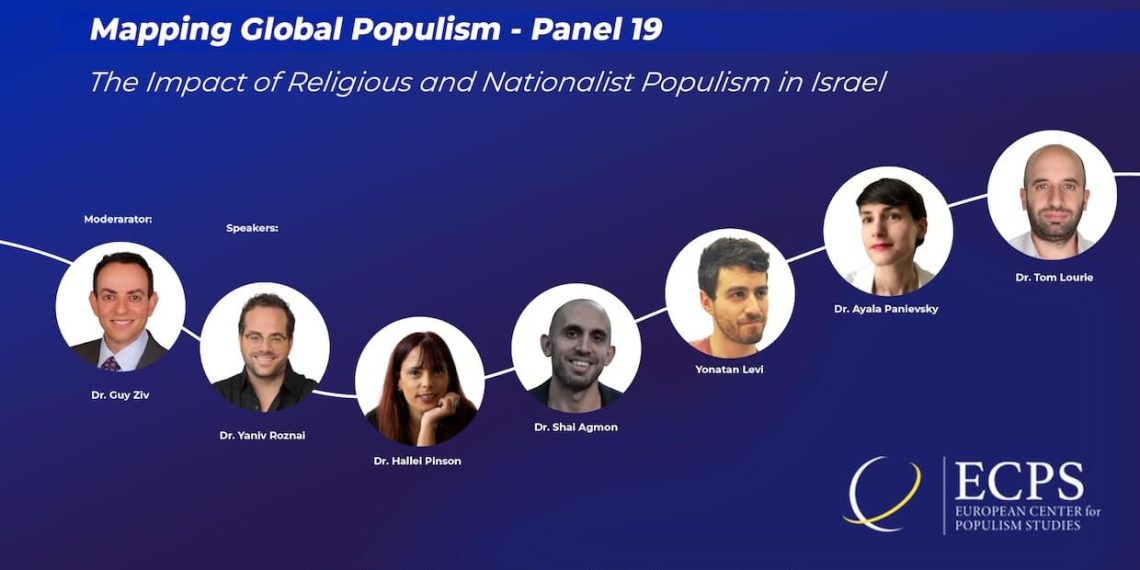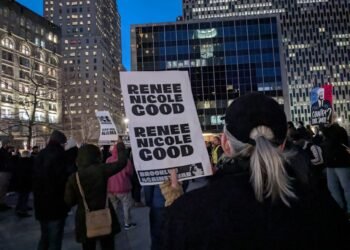Please cite as:
Stamoglou, Anastasia. (2025). “The Impact of Religious and Nationalist Populism in Israel.” European Center for Populism Studies (ECPS). March 24, 2025. https://doi.org/10.55271/rp0095
This report examines the key discussions from the 19th session of the Mapping Global Populism (MGP) Panel Series, hosted by the ECPS on February 27, 2025. The session explored the influence of religious and nationalist populism on Israeli politics, media, and education. Prominent scholars analyzed how judicial overhauls, security-driven rhetoric, media manipulation, and educational policy shifts contribute to democratic erosion in Israel. The report highlights the increasing concentration of power, the delegitimization of opposition voices, and the broader global implications of Israel’s populist trends. By drawing comparisons with other global populist movements, the discussion underscored the necessity of protecting democratic institutions, ensuring media freedom, and preserving independent education.
Report by Anastasia Stamoglou
Introduction
The 19th session of the Mapping Global Populism Panel Series, hosted by the European Center for Populism Studies (ECPS), examined the influence of religious and nationalist populism in Israel. The discussion highlighted how populist rhetoric, policy decisions, and institutional changes have shaped the country’s political, educational, and media landscapes. As populist leaders consolidate power, the balance between democratic governance and nationalist ideologies is increasingly at risk. The panel, moderated by Dr. Guy Ziv, Associate Professor at American University’s School of International Service, featured experts including Dr. Yaniv Roznai, Dr. Haleli Pinson, Dr. Shai Agmon, Yonatan Levi, Dr. Ayala Panievsky, and Dr. Tom Lourie. Their insights provided a comprehensive analysis of the challenges facing Israel’s democracy and the broader implications of populist movements.
The Institutional Vulnerabilities of Israeli Democracy
Dr. Yaniv Roznai, Professor of Constitutional Law at Harry Radzyner Law School, Reichman University, opened the discussion by addressing the institutional weaknesses that make Israeli democracy particularly susceptible to populist influence. Unlike many democracies with rigid constitutional frameworks, Israel’s legal system is built upon Basic Laws that can be easily amended by a simple parliamentary majority. This structural fragility allows populist leaders to implement sweeping judicial overhauls and consolidate executive power with relative ease.
Dr. Roznai argued that recent attempts to weaken judicial oversight, particularly through proposed reforms aimed at curbing the powers of the Supreme Court, illustrate the dangers of this malleable legal framework. The Israeli government’s judicial overhaul efforts have been widely criticized as a direct assault on democratic institutions. Proponents of these measures frame them as necessary corrections to an overly interventionist judiciary, while critics warn that they enable executive overreach and threaten the rule of law. The public backlash against these proposed reforms, including large-scale protests, underscores the importance of an independent judiciary in maintaining democratic integrity.
Populism and the Transformation of Israeli Education
Dr. Halleli Pinson, Associate Professor at the School of Education at Ben-Gurion University, examined the role of right-wing populism in reshaping Israel’s education system. Education serves as a powerful tool for ideological reinforcement, and the rise of nationalist and religious populism has had a profound impact on curriculum design and policy decisions. Dr. Pinson identified three key trends in this transformation: the exclusion of critical perspectives, the promotion of nationalist narratives, and the increasing influence of religious ideology in state education.
One of the most notable examples of this shift is the banning of Breaking the Silence, an NGO composed of former Israeli soldiers who provide testimonies on the ethical dilemmas of military service in the occupied territories. The exclusion of such organizations from schools reflects a broader effort to limit exposure to dissenting views and reinforce a singular national narrative. Additionally, right-wing organizations have exerted pressure on the higher education system, targeting academics perceived as left leaning and promoting legislative efforts to curtail academic freedom.
Pinson also highlighted the growing presence of religious-nationalist ideology in Israeli schools. Policies favoring religious institutions over secular ones have facilitated the integration of theological perspectives into public education, further intensifying nationalist discourse. This shift has long-term implications, as it influences young generations’ understanding of national identity, democracy, and civic engagement. The suppression of alternative viewpoints and the promotion of a singular ideological framework contribute to a more polarized society, limiting the space for critical discussion and democratic engagement.
Security and Populist Political Strategy
Dr. Shai Agmon, Assistant Professor in Political Philosophy at UCL, and Yonatan Levi, PhD candidate at European Institute, LSE, explored the intersection of security and populist politics in Israel. Populist leaders frequently use security threats—both real and perceived—to justify policies that concentrate power and marginalize political opponents. Netanyahu’s political strategy has consistently framed opposition voices, civil society organizations, and minority groups as existential threats to national security, reinforcing a sense of urgency that legitimizes authoritarian measures.
Levi emphasized that this security-driven populism creates a climate in which dissent is equated with national disloyalty. Arab citizens, left-wing activists, and human rights organizations are often portrayed as internal threats, weakening their political legitimacy and restricting their participation in public discourse. This strategy not only consolidates power for the ruling elite but also fosters an ‘us vs. them’ mentality that deepens societal divisions.
Dr. Agmon further noted that security populism has led to the normalization of emergency measures that restrict civil liberties. Policies initially implemented as temporary responses to security crises—such as increased surveillance, restrictions on protests, and limitations on press freedoms—have gradually become permanent fixtures of Israel’s political landscape. This entrenchment of security-driven policies reflects a broader global trend in which populist leaders use crisis rhetoric to justify democratic backsliding.
The Role of Media in the Rise of Populism
Dr. Ayala Panievsky, Presidential Fellowship at School of Communication & Creativity, City University of London,provided a critical analysis of how populist leaders manipulate media narratives to control public discourse. The decline of independent journalism in Israel has been exacerbated by both state interference and the rise of alternative media platforms that amplify populist messaging.
One of the most effective strategies used by Netanyahu and his allies is the delegitimization of traditional media. Critical journalists and independent news organizations are frequently labeled as ‘leftist’ or ‘anti-Israel,’ eroding public trust in factual reporting. Simultaneously, government-affiliated media outlets promote a narrative that aligns with the populist agenda, reinforcing partisan divisions.
Social media has also played a crucial role in the spread of populist rhetoric. Netanyahu’s use of direct communication channels, such as Twitter and Facebook, allows him to bypass traditional media and address his supporters unfiltered. This direct engagement fosters a sense of loyalty and reinforces populist claims that mainstream media cannot be trusted. However, it also contributes to the spread of misinformation and the erosion of journalistic integrity.
Dr. Panievsky warned that the combination of media suppression, state influence, and social media manipulation creates an environment in which critical voices are drowned out. The decline of media independence undermines democratic accountability, allowing populist leaders to operate with minimal scrutiny.
Populism as a Survival Strategy
Dr. Tom Lourie, Researcher, Political Science, UC Irvine, examined how populism serves as a political survival strategy for embattled leaders. Netanyahu’s use of populist rhetoric has intensified in response to legal challenges, particularly his ongoing corruption trials. By framing himself as a victim of an elitist conspiracy, Netanyahu has successfully mobilized his base and delegitimized judicial institutions that threaten his hold on power.
Dr. Lourie compared Netanyahu’s tactics to those of other populist leaders, including Donald Trump, Viktor Orbán, and Jair Bolsonaro. A common pattern emerges when faced with legal or political crises, populist leaders adopt an anti-elitist stance, rallying their supporters against perceived enemies within the judiciary, media, and opposition parties. This strategy not only diverts attention from legal troubles but also reinforces the populist leader’s position as the true representative of the people.
The personalization of political power in populist movements poses a significant challenge to democratic institutions. Dr. Lourie emphasized that as long as populist leaders successfully frame themselves as indispensable to the survival of the nation, their supporters will continue to defend them against institutional checks and balances. This dynamic creates a feedback loop in which democratic erosion accelerates, making institutional recovery increasingly difficult.
Conclusion
The 19th session of the MGP Panel Series provided a comprehensive exploration of the impact of religious and nationalist populism in Israel. The discussions highlighted how populist rhetoric shapes policy, undermines democratic institutions, and fosters societal divisions. From the erosion of judicial independence and academic freedom to the manipulation of media and the securitization of political discourse, populism has fundamentally altered Israel’s democratic landscape.
The insights shared by the panelists underscore the urgent need for institutional safeguards against democratic backsliding. Strengthening judicial independence, protecting media freedom, and ensuring educational plurality are essential to countering the influence of populist movements. As Israel navigates these challenges, the lessons drawn from this discussion serve as a valuable resource for policymakers, scholars, and civil society organizations committed to preserving democratic governance.
Through its interdisciplinary approach, the session reinforced ECPS’s commitment to fostering critical discourse on the global impact of populism. By examining the mechanisms and consequences of populist governance, the panel contributed to a broader understanding of the threats facing democratic societies worldwide.


